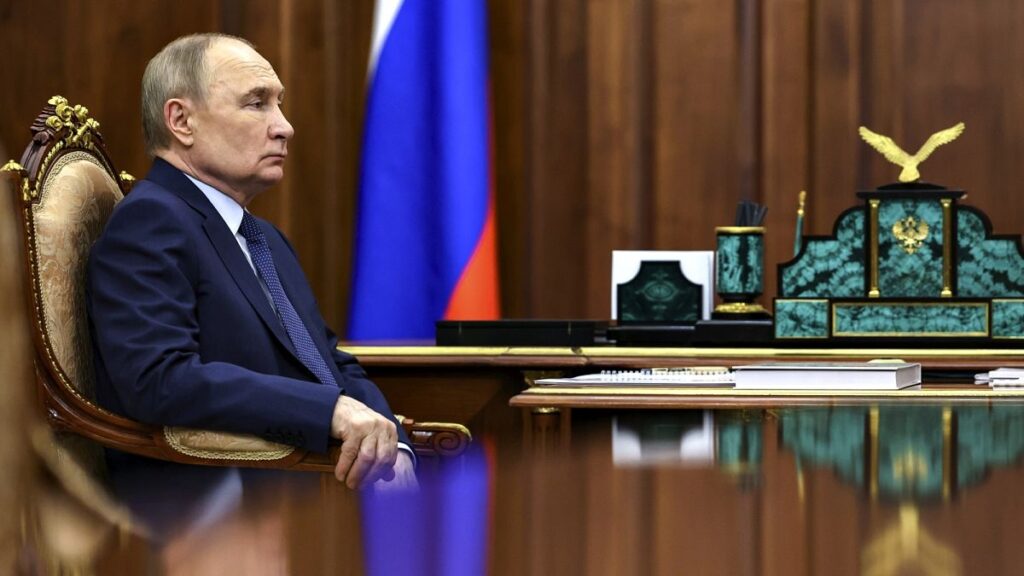The European Union has formally proposed a fresh round of sanctions against Russia to pressure the Kremlin into accepting a 30-day unconditional ceasefire in Ukraine, a step that Western allies consider an indispensable prelude to serious peace negotiations.
If approved by member states, it would mark the 18th package of sanctions since February 2022, the largest regime ever imposed by the bloc.
The latest proposal, unveiled on Tuesday by European Commission President Ursula von der Leyen and High Representative Kaja Kallas, blacklists an additional 22 Russian banks and extends the ban on transactions to entities based outside the country that contribute to the circumvention of sanctions. The Russian Direct Investment Fund, a sovereign wealth fund with an estimated capital of $10 billion (€8.75 billion), is targeted.
“Russia continues to bring death and destruction to Ukraine,” von der Leyen said. “Russia’s goal is not peace, it is to impose the rule of might.”
The crackdown on the “shadow fleet” continues with the designation of 77 vessels. So far, Brussels has gone after almost 350 tankers from the old-age, poorly kept fleet, denying them access to EU ports and EU services.
The plan also features a ban on the direct or indirect use of the Nord Stream pipelines that connect Russia and Germany. The underwater pipelines are today non-operational, and Berlin has ruled out the prospect of restarting gas transit after the war ends.
“There is no return to the past,” von der Leyen said.
The most notable element of the proposed package is a downward revision of the price cap on Russia’s seaborne oil, which was established at the G7 level in December 2022.
The cap was set at $60 per barrel of crude and has remained unchanged since then, despite ample fluctuations in Russia’s trade and evidence of circumvention. The Nordics and the Baltics have long called for a revision to reflect market dynamics.
On Tuesday, von der Leyen pitched a new cap of $45 per barrel, in addition to a prohibition to importing refined products that are made with Russian crude oil and traded under a different label. These mostly come from India and Turkey.
Going it alone
In theory, the EU could pass new legislation to bring down the level of the cap on its own in an attempt to further squeeze Moscow’s profits. However, doing so without the participation of the United States could create a cacophony and weaken the initiative, which is supposed to have a worldwide effect.
Until now, Donald Trump has refused to apply new sanctions against Russia, even if his rhetoric towards Vladimir Putin had hardened over the slow pace of negotiations and the continued barrage of attacks against Ukrainian cities. Trump’s position has driven a wedge across the Western front, with the EU, the UK and Canada moving ahead with fresh restrictions while Washington takes a step back.
The tensions in the alliance will come to the fore on Sunday during a G7 summit in Canada, where the revision of the price cap will be high on the agenda.
Asked if the EU would go it alone, von der Leyen suggested it would not, at least not for the time being.
“My assumption is that we do that (the revision of the price cap) together as G7,” she said. “We started as G7, it was successful as a measure from the G7, and I want to continue this measure as G7.”
Meanwhile, EU officials and diplomats insist on piling extra pressure on the Kremlin regardless of the course of action that the White House chooses to take. Trump’s direction, though, could influence deliberations in Brussels, as unanimity among the 27 member states is required to approve the 18th package.
Hungary and Slovakia have, in recent months, ramped up their criticism against sanctions, arguing they cause more damage to the bloc’s economy than to Russia’s.
Earlier this year, Hungary threatened to veto the renewal of all sectoral sanctions, an against-the-clock experience that prompted officials to start working on legal shortcuts, particularly with a view to protecting the estimated €210 billion in Russia’s frozen assets.
Last week, Slovakia’s parliament narrowly passed a resolution urging the government to oppose further trade restrictions against Russia.
“If there is a sanction that would harm us, I will never vote for it,” Slovak Prime Minister Robert Fico said after the vote in parliament. “I am interested in being a constructive player in the European Union, but not at the expense of Slovakia.”
Still, for all their antagonistic talk, neither Hungary nor Slovakia has gone as far as completely preventing the adoption of a new package of sanctions.
Read the full article here
